Zotero vs Mendeley: Which reference manager is better?
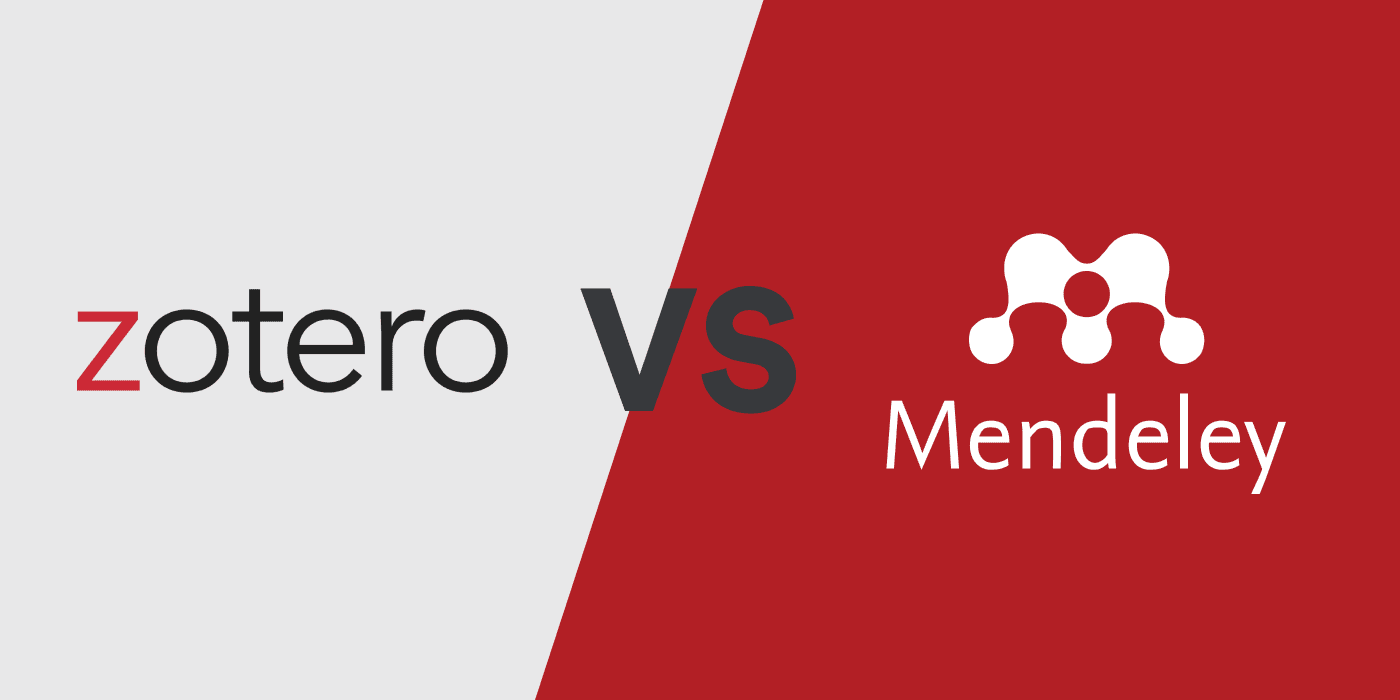
Reference management software simplifies the essential but burdensome tasks of managing, storing, organizing, and formatting references for researchers.
Yet, the abundance of reference management options available can make the task of picking the perfect one for your needs daunting. To simplify this decision-making process, let's delve into two prominent reference management solutions: Zotero and Mendeley.
Zotero vs Mendeley: Detailed feature comparison table
Below is a comparative overview of the key functionalities of each tool. For a more comprehensive evaluation of how Zotero and Mendeley differ, read on.
| Zotero | Mendeley | |
|---|---|---|
| Platform Compatibility | 6/7 | 4/7 |
| Web | ||
| iOS | ||
| Android | Third-party apps only | |
| Windows | ||
| MacOS | ||
| Linux | ||
| ChromeOS | Set up Linux terminal | |
| Web clipper | 5/5 | 5/5 |
| Chrome | ||
| Edge | ||
| Safari | ||
| Firefox | ||
| Organize references Add references to folders within extension popup | ||
| Writing Platforms | 4/4 | 3/4 |
| Word on Windows | ||
| Word on Mac | ||
| Google Docs | ||
| Overleaf Live BibTeX integration with Overleaf | ||
| Data Import | 3.5/6 | 3.5/6 |
| Manual import with auto-completion Start typing in a title, URL, or DOI and the reference data will be filled automatically | Autocompletion only if DOI, arXiv ID or PubMed ID entered | |
| Bulk data import Users can upload RIS, BibTeX, NBIB, and PDF files. | NBIB files can’t be imported | |
| In-app literature search | ||
| Bulk import from web databases | ||
| Metadata extract from PDFs | ||
| Create references from identifiers Generate references from DOI, PMC ID, arXiv ID, PubMed ID or ISBN | No PMC IDs | No PMC IDs or ISBNs |
| Data Export and Backup | 2.5/6 | 2/6 |
| BibTeX Export BibTeX files | ||
| RIS Export RIS files | ||
| Google Drive | ||
| Github | ||
| OneDrive | ||
| Full data export Export all bibliographic data, labels, folders, and PDF files with annotations | PDFs with annotations must be downloaded individually | |
| Sharing and Collaboration | 3/4 | 2/4 |
| Shared folders Integrated sharing that does not require set up of external folders in other cloud storage apps or databases | ||
| Unlimited collaborators No limit on the number of users who can access a shared folder | ||
| Collaborators can add, edit, and remove references | ||
| Share references with sharing link | ||
| PDF management | 2/6 | 2/6 |
| Custom PDF file naming | ||
| Sticky notes | ||
| Highlight annotation | ||
| Freehand drawing | ||
| Custom highlight colors | ||
| Free text annotations Write anywhere directly on pdf | ||
| Library management | 6/10 | 7.5/10 |
| Labels Also called tags | ||
| Folders | ||
| Subfolders | ||
| Starred items Also called favorites. Automatic filtering of important references displayed in UI | ||
| Notes | ||
| Duplicate detection Easily spot duplicates in your library | ||
| Detect incomplete references Automatic filtering of incomplete references | ||
| Auto-update reference metadata Get reference data updates automatically | Can look up metadata by identifier | |
| Find full text PDFs | ||
| Bulk editing of references | ||
| Library search | 5/6 | 1/6 |
| Full-text PDF Search Include full text in search | ||
| Exact phrase search Over library (fields and full-text pdfs) | ||
| Author search Search author field | ||
| Notes search Include notes in search | ||
| PDF annotations search Include PDF annotations in your search | ||
| Highlight search terms in search results | ||
| Citing | 3/4 | 1.5/4 |
| Copy citation to clipboard | Only 10 citation styles | |
| Choose citation style (Word, Google Docs) | Word only | |
| Cite from library (Word, Google Docs) | Word only | |
| Cite from online search | ||
| LaTeX Support | 2.5/3 | 1/3 |
| Copy BibTeX to clipboard | ||
| Create custom BibTeX key pattern | Third party plugin needed | |
| BibLaTeX support Export .bib file with BibLaTeX fields | ||
| Support and Community | 1/3 | 1/3 |
| Community forum | ||
| Customer support via in app chat | ||
| Customer support by email | ||
| Pricing | ||
| Free version (e.g., short-one time project) | Up to 300MB cloud storage for PDFs free | Up to 2GB cloud storage for PDFs free |
| Academic user subscription price | $120/year for unlimited cloud storage | $165/year for unlimited cloud storage |
What is Zotero?
Zotero an open-source reference management tool, enables users to gather, organize, and cite research materials.
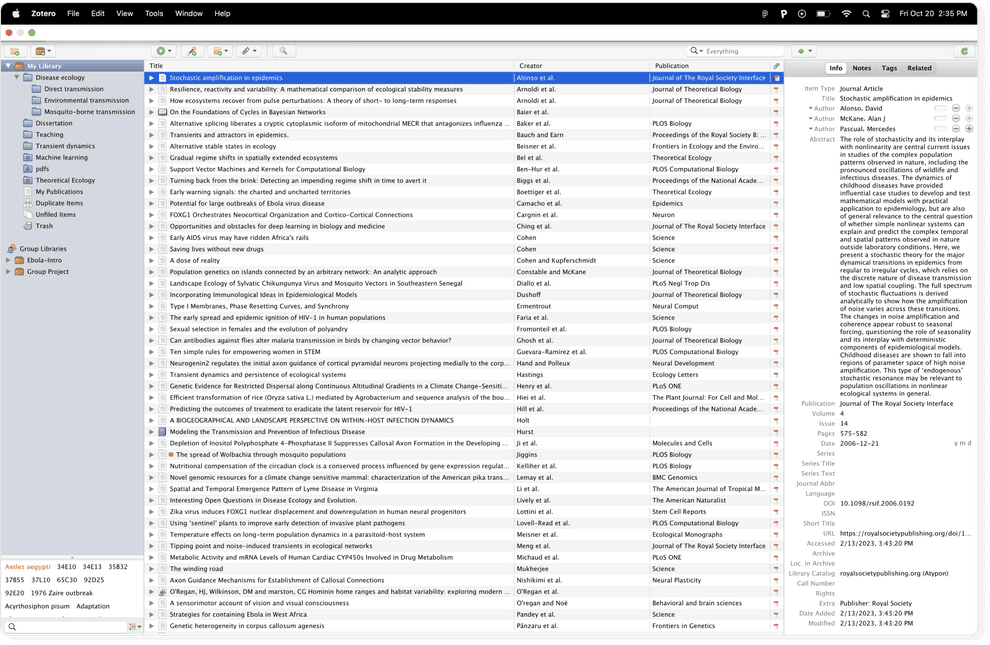
What is Mendeley?
Mendeley Reference Manager assists researchers with paper organization, PDF annotation, and citation creation.
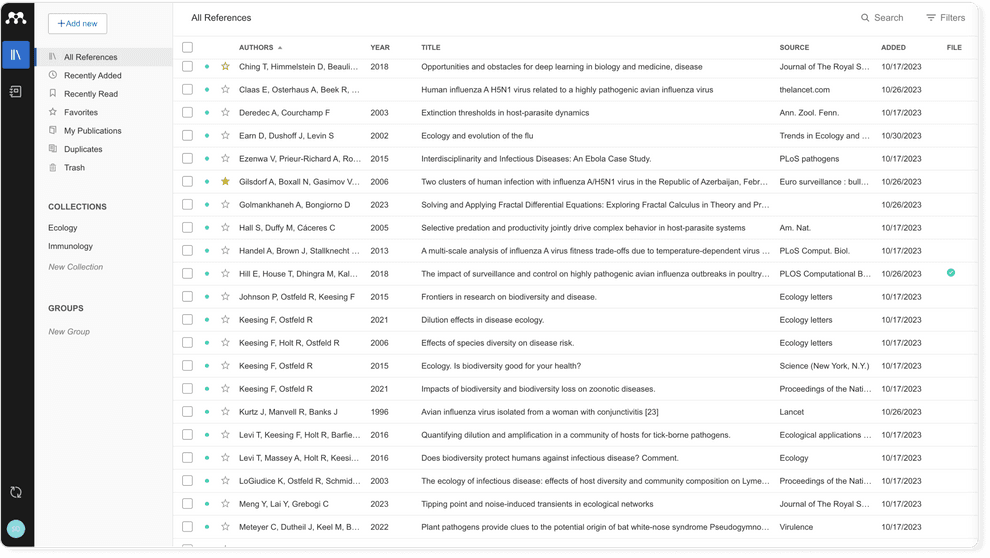
Zotero vs Mendeley: 3 factors to consider
When deciding between Zotero and Mendeley for managing references, you should consider several factors. However, the decision essentially comes down to a few crucial aspects:
Mobile support. Zotero has an iOS app and user-made apps for Android for reading and annotating PDFs, collecting references, and creating citations. In contrast, Mendeley stopped development of their mobile apps in 2021.
Word processing integrations. Zotero has plugins for Word, Libre Office and Google Docs that allow users to create reference lists automatically. Mendeley Cite allows users to generate bibliographies in Word, Microsoft Office 365, and Word on iPad.
Origin and ownership. Originally developed independently, Mendeley was acquired by Elsevier, a major academic publisher. Zotero is an open-source tool supported by the Corporation for Digital Scholarship.
Zotero vs Mendeley: Mendeley offers more cloud storage than Zotero on its free plan
You can get started using Mendeley and Zotero for free. This makes both tools a good choice for researchers on a budget. Both offer tiered pricing if you need to increase cloud storage.
You can download Zotero without having to make an account to use it, but by signing up for a Zotero account, you can:
- Get up to 300MB cloud storage for attachments (you must pay a subscription fee if you wish to have more storage)
- Access your library online and from different computers
- Collaborate with other researchers by allowing you to create and join groups.
On the other hand, you must create an account to use Mendeley and you need to be signed in to use its desktop app. But the free plan gives you 2GB of cloud storage for PDFs—a sizable library. You will need to upgrade to a premium account if you need more storage.
Zotero vs Mendeley: Zotero has more sophisticated search functions
Zotero has two core search features:
- Quick Search: Searches across titles, authors and year by default, but you can also search across all fields and tags and search “Everything”—all fields, tags, and PDFs.
- Advanced Search: Facilitates a more finely tuned search. Multiple search conditions can be added to refine the search. For each condition, users can select a field, a condition (e.g., contains, does not contain, is, is not, begins with), and the value they're searching for. You can also save search results to a collection that updates as you add references to your library.
In contrast, Mendeley has only a search box at the top of the reference list, which allows the user to search across titles, authors, years, and source types. You can restrict this search over a collection or group. You can also search by author and tag under the Filters option. But you can’t control your search using conditions, or search the full-text of PDFs, which is a limitation once your library grows.
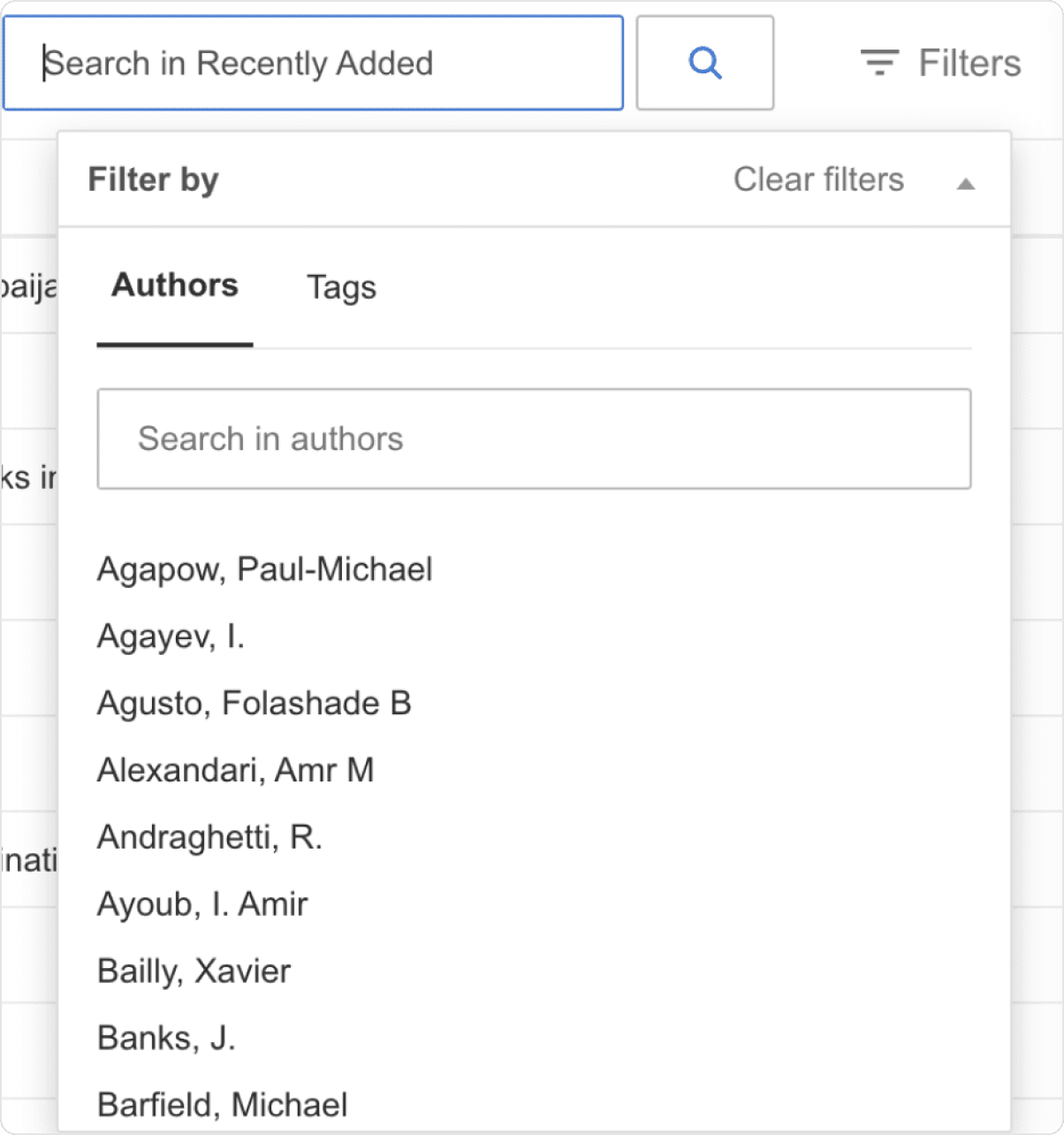
Zotero vs Mendeley: Mendeley has a more user-friendly UI than Zotero
The main window of Zotero is divided into three primary panes: the left pane for collections and tags, the center pane for bibliographic item lists, and the right pane for item information.
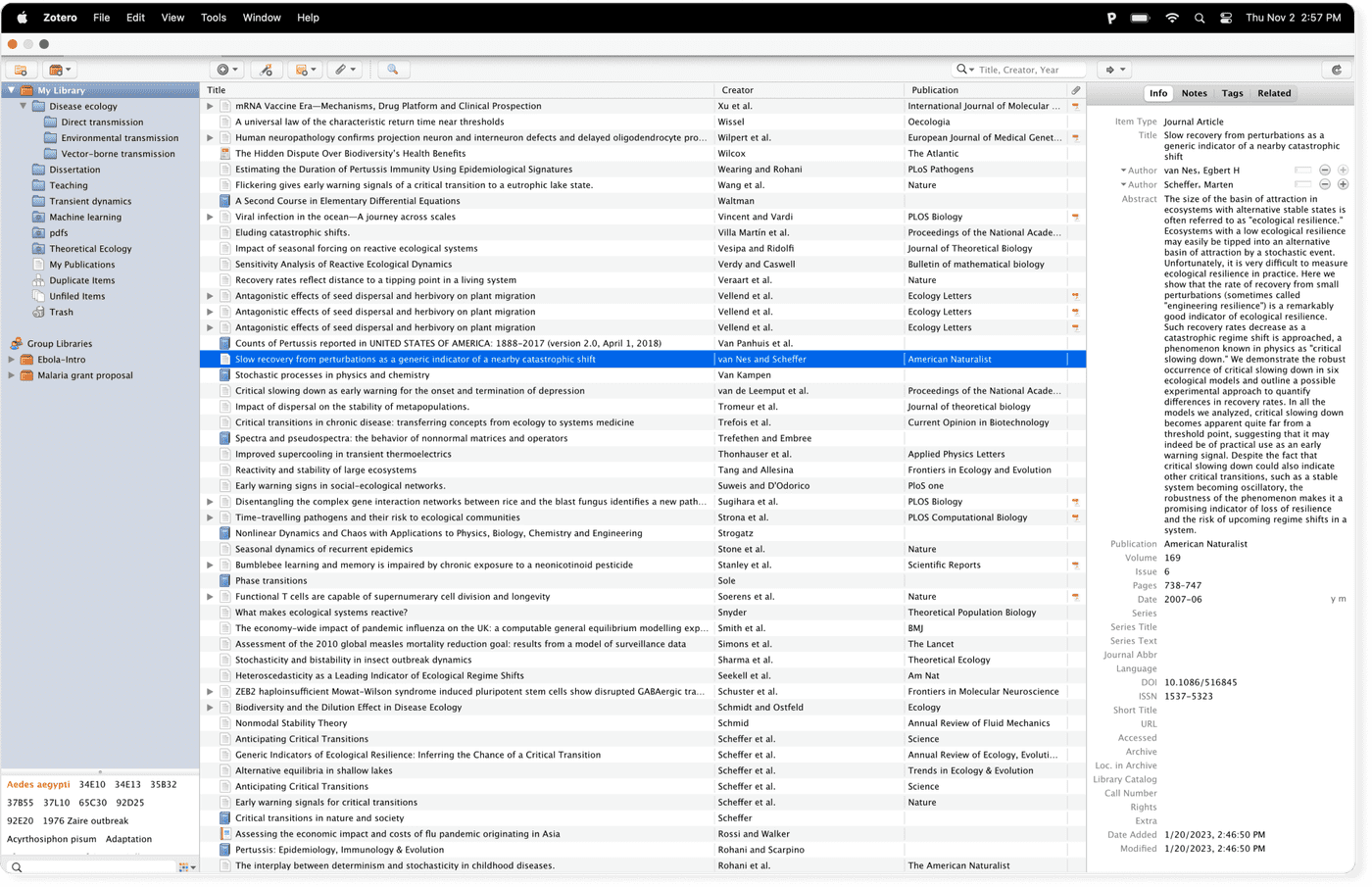
While the neutral color scheme is visually pleasing, the overall look is functional rather than modern, and there are a lot of features squeezed into the main window. Buttons at the top allow users to create references with identifiers, add new items manually, create new notes, create new collections, and sync their library. On top of that, there is an extensive menu toolbar with a myriad of options.
Worst of all, the center pane uses a tiny font for references and small spacing between items. In sum, while this interface is feature-rich, it is also a lot for a new user to understand, and it can take some time to get the most out of Zotero.
In contrast, Mendeley has a clean user interface and it is easy to access the core features of organizing, exporting, and creating citations. The references in the center panel are spaced for readability, and the interface has a left sidebar for some features (notebook, sync, and account). The left panel automatically tracks “Recently Added” and “Recently Read” references, and you can mark references as “Favorites” by adding stars to items in the reference list.
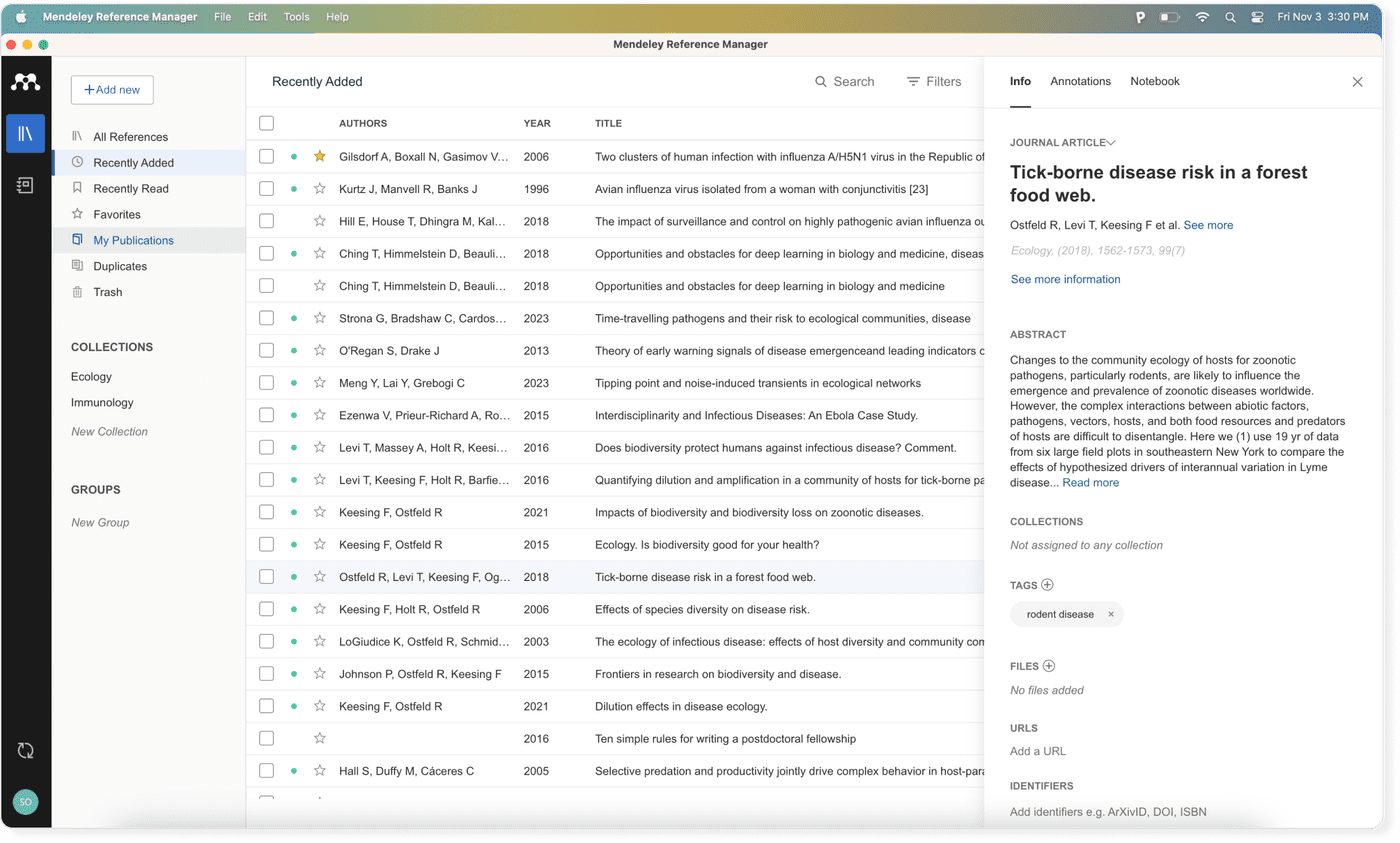
Zotero vs Mendeley: Zotero is more feature-rich than Mendeley
Zotero offers a range of advanced features that cater to the diverse needs of researchers.
- Third party plugins: Being open-source, Zotero has a wide range of community-developed plugins that can add a variety of specialized functionalities for metadata import, file management, and writing integrations. But since these are not officially supported by Zotero, it is to the generosity of amateur developers to continue supporting these features. In contrast, as a commercial product, Mendeley does not support user-made plugins.
- Copy citation options: Zotero’s Quick Copy feature allows you to copy citations in 15 styles, whereas Mendeley allows you to copy citations in just ten citation styles via its Preferences menu.
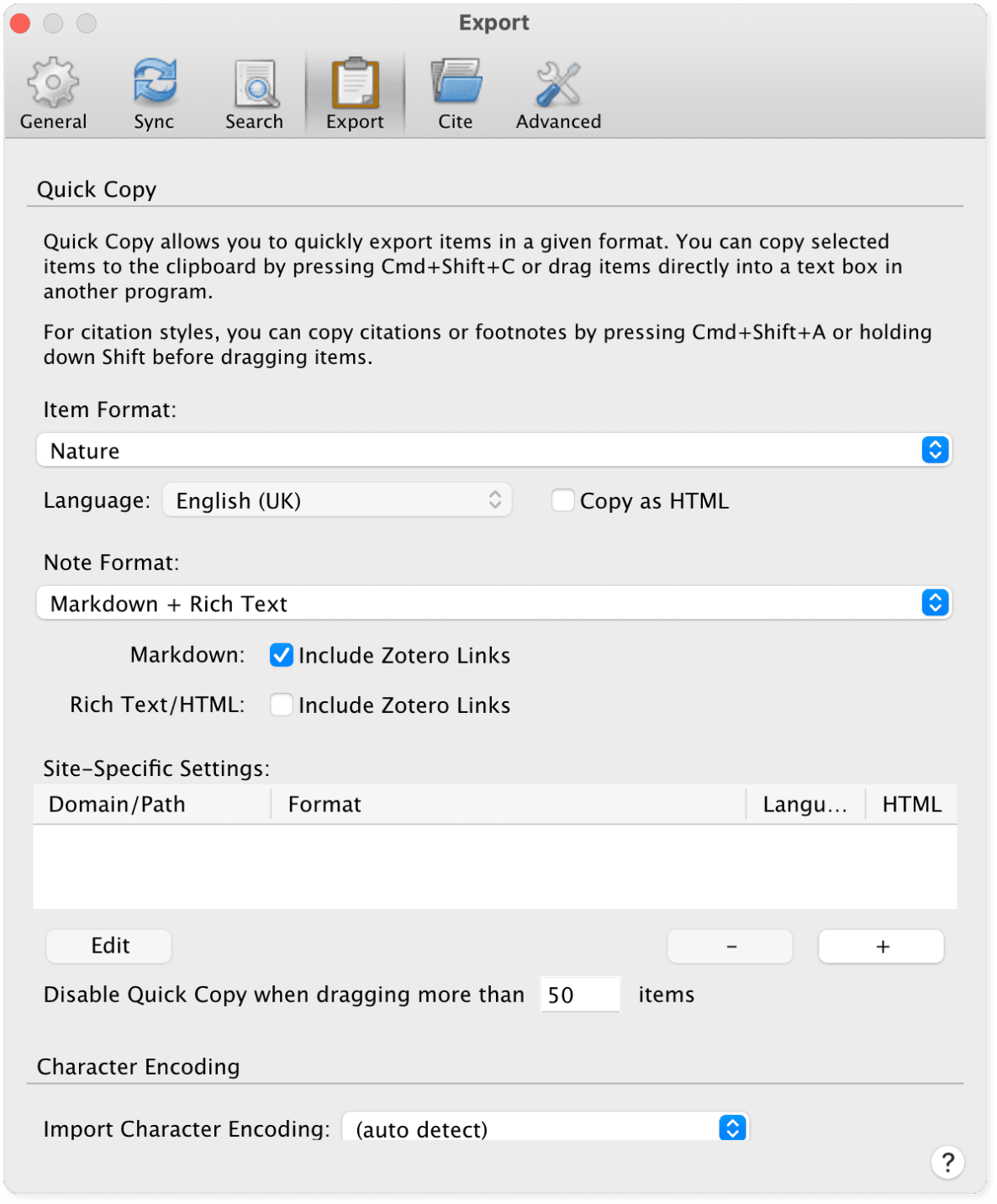
- Automatic creation of book references: Zotero allows you to create book references from ISBNs with the “Add Item by Identifier button”. Like Zotero, Mendeley can create references from DOIs, PubMed IDs and arXiv IDs, but not ISBNs.
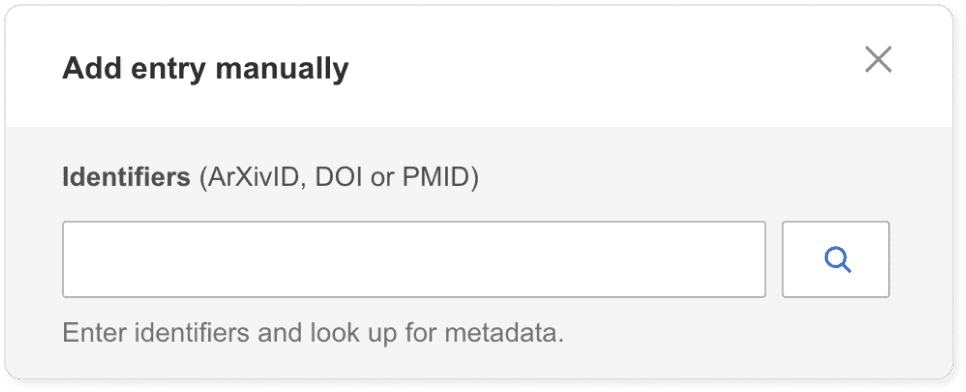
- Export options: Zotero allows you to export your references in a multitude of formats. Mendeley, on the other hand, only permits reference export to RIS, BibTeX and XML from its desktop app. You can also get all of your PDFs from the Zotero folder on your computer whereas you need to download PDFs one-by-one in Mendeley Reference Manager.

Zotero vs Mendeley: Mendeley has official customer support whereas Zotero does not
As a commercial product, Mendeley offers a structured customer support system via its help center, over email, and via chat. If you prefer to have access to traditional customer support, then Mendeley is a good choice.
Zotero, on the other hand, does not offer official customer support—just a user forum. Users can ask questions, and they are often answered by other experienced users or Zotero staff. But if you have an urgent issue, you cannot email or chat to anyone to get the problem resolved.
Zotero vs Mendeley: Zotero has more flexible sharing capabilities
Both Mendeley and Zotero offer functionality for creating and managing groups, allowing users to collaborate and share references. However, there are three main differences in how these groups function and the features they offer.
- Mendeley free account users can create up to 5 groups and each group can have a maximum of 25 members. To go beyond these limits, you need to upgrade your account. In contrast, Zotero does not limit the number of collaborators you can have in a group and the number of groups you can be an admin of.
- Zotero allows you to create public groups, which can be particularly useful for larger collaborative projects or public bibliographies. Mendeley retired this feature in 2020.
- Mendeley offers granular permissions, allowing group owners to decide who can add documents, who can annotate, etc. Zotero, on the other hand, provides detailed roles and permissions. Group owners can assign roles (e.g., owner, admin, member) and set permissions for adding items, editing, and more. Allowing for different roles with specific permissions is particularly useful for managing large projects or in classroom settings.
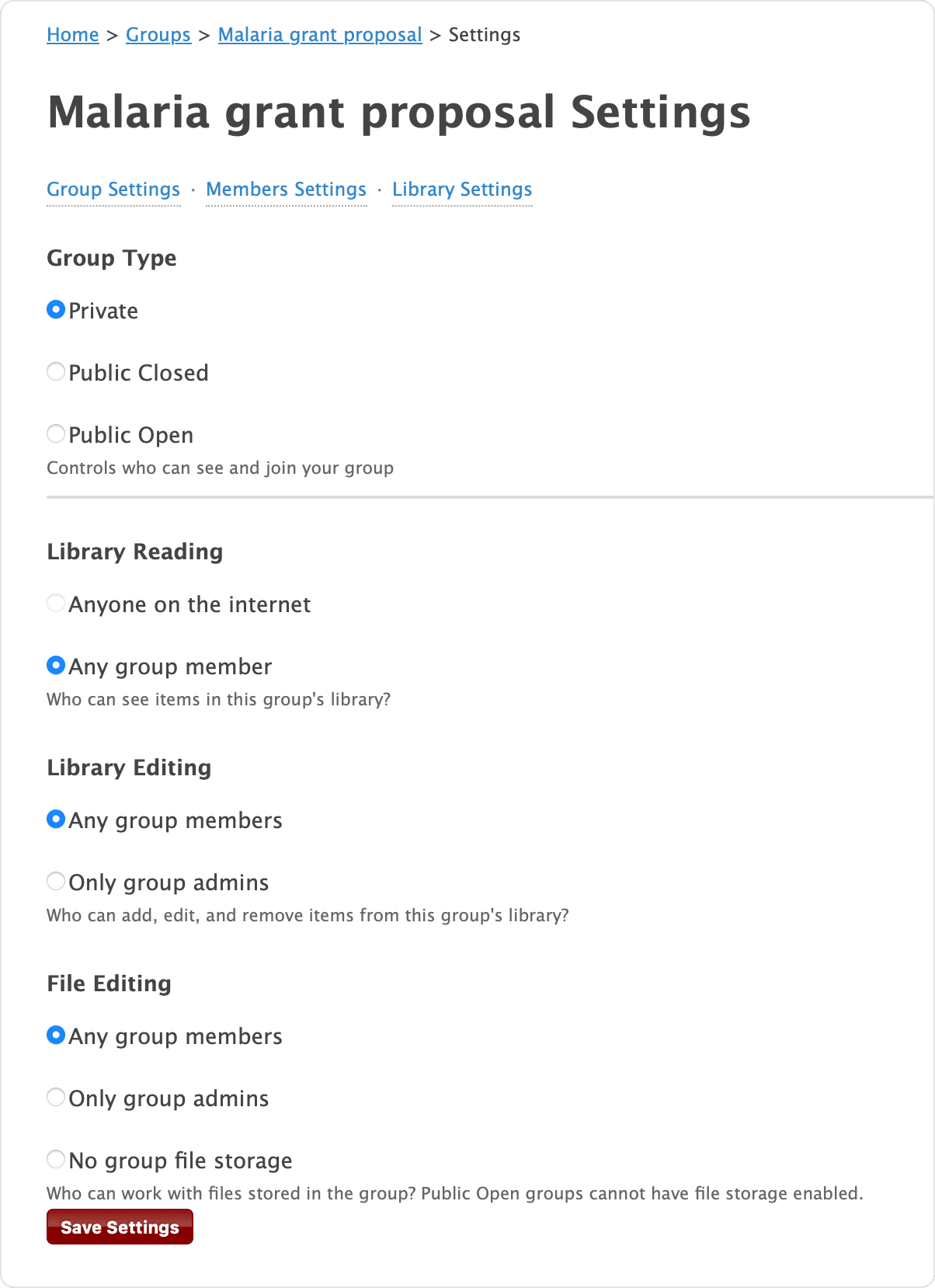
If you need more flexibility in the types of groups you can create and how many collaborators you would like to access the shared database, then Zotero is the choice for you.
Zotero vs Mendeley: Which is better
Choosing between Mendeley and Zotero largely depends on individual preferences, specific needs, and the contexts in which you intend to use your reference manager. Both tools have their strengths and limitations.
Zotero is the better choice if:
- You require extensive customization options and advanced features
- You prefer to use an open source tool with an active community.
Mendeley is the better choice if:
- You like a clean, streamlined user interface and you’ve a manageable library without need for advanced features
- You prefer to have formal customer support.
To decide for yourself, you should try each out.
Related reading
⇨ How to move your data from Mendeley to Paperpile